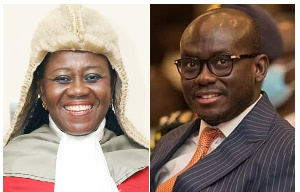The Herald has obtained exclusive details regarding the transfer of Justice Kwasi Anokye Gyimah, who is currently presiding over the criminal case involving Dr. Stephen Kwabena Opuni and Alhaji Seidu Agongo. This unexpected administrative move was orchestrated by Chief Justice Gertrude Araba Esaaba Torkornoo. In this article, we delve into the shocking transfer of Justice Gyimah, the implications it holds for the COCOBOD trial, and the controversies surrounding the case.
The transfer of Justice Kwasi Anokye Gyimah from the COCOBOD trial has sent shockwaves through the legal community and raised concerns about the integrity of the judicial process. The sudden nature of the transfer, combined with the high-profile nature of the case, has led many to question the motives behind this administrative decision. In this article, we will examine the details surrounding Justice Gyimah’s transfer, explore the ongoing COCOBOD trial, and shed light on the controversies that have plagued the case.
The Transfer of Justice Kwasi Anokye Gyimah
According to sources, Justice Kwasi Anokye Gyimah, who has been a strong advocate for a fair trial, has been reassigned to Kumasi in the Ashanti Region. This transfer comes as Justice Gymah awaits the Court of Appeal’s decision on his order to start the trial afresh. The Court of Appeal is set to deliver its judgment on July 3, 2023, regarding the Attorney General’s appeal against the restart of proceedings as directed by Justice Gymah.
Chief Justice Gertrude Araba Esaaba Torkornoo personally informed Justice Gyimah of his transfer via a phone call, followed by a transfer letter instructing him to vacate the High Court – Land Court 2 in Accra and relocate to Kumasi immediately. Legal experts have expressed suspicions of ulterior motives behind this sudden transfer, noting that such actions are typically carried out during legal vacations.
The Transfer and its Consequences
Justice Gymah’s unexpected transfer has sent ripples through the legal community and the ongoing case in question. Due to the administrative decision made by Chief Justice Torkornoo, it is evident that Justice Gymah will no longer be presiding over the case. This transfer introduces uncertainty and raises concerns about the continuity and progress of the trial.
Meanwhile, during the adjournments prompted by the transfer, the government faced challenges in presenting its witnesses to substantiate their claims of financial loss to the state. The trial revolves around Dr. Opuni, Alhaji Agongo, and Agricult, an agro-based private company owned by Alhaji Agongo. Attorney General Godfred Yeboah Dame, in response to Justice Gymah’s transfer, filed an appeal with the Court of Appeal. The appeal alleged that Justice Gymah had “misdirected himself” in terms of the adoption of evidence during the trial.
In parallel, the Court of Appeal, headed by Justice Philip Bright Mensah, with panelists Justice Ernest Owusu-Dapaah and Justice Jennifer Dadzie, heard arguments from the Attorney General against commencing the case anew. The Attorney General, Godfred Dame, sought to quash Justice Gymah’s decision to start the case de novo. Mr. Dame contended that the high court judge had misapplied the principles governing the adoption of evidence, leading to a potential miscarriage of justice and impeding an efficient trial.
Justice Gymah’s Background and Expertise
To better understand the significance of Justice Gymah’s transfer and the implications for the case, it is essential to delve into his background and expertise. Known for his meticulousness and strong work ethic, Justice Gymah’s career has been characterized by excellence and a commitment to justice.
Justice Gymah embarked on his legal journey following a successful period in private practice. Graduating from the Ghana School of Law as the top student in 2002, he outshone renowned legal academic Professor Kofi Abotsi, who presently serves as the Dean of UPSA Law School. Both Justice Gymah and Prof. Abotsi were standout graduates from the University of Ghana’s Faculty of Law, where they honed their legal acumen.
Furthermore, Justice Gymah augmented his legal knowledge by obtaining an LLM degree in International Criminal Justice and Armed Conflict from the esteemed University of Nottingham in 2005. This specialization in international law provided him with a broader perspective and expertise in handling complex legal matters.
Justice Gymah’s dedication and contributions to the field of law have not gone unnoticed. In February 2017, he received a Professional Achievement Award at the British Council Ghana’s Alumni Awards Gala night. This recognition further solidifies his standing as a respected and accomplished legal professional.
The Controversial COCOBOD Trial
The COCOBOD trial involves Dr. Stephen Kwabena Opuni, the former CEO of the Ghana Cocoa Board (COCOBOD), and Alhaji Seidu Agongo, a businessman. They are facing charges related to alleged financial malfeasance and corruption in the procurement and distribution of fertilizer.
Justice Jackson Clemence Honyenuga, a retired Supreme Court judge, was initially prohibited from presiding over the case in July 2021 due to accusations of bias. However, upon review, the Attorney General filed an appeal, and in a subsequent 4-3 decision, Justice Honyenuga was reinstated. Justice Kwasi Anokye Gyimah took over the case after Justice Honyenuga’s reinstatement.
Justice Gyimah firmly stood his ground, asserting that given the high-profile and politically sensitive nature of the trial, it would be unfair to continue with proceedings that were marred by numerous allegations. He believed that starting the trial ‘De Novo’ (afresh) would provide the court with firsthand information and ensure a fair trial for the accused.
Conclusion
The transfer of Justice Gymah from the case has sparked concerns about the continuity and progress of the ongoing trial. The decision, made by Chief Justice Torkornoo, has raised questions about the potential impact on the administration of justice. Attorney General Godfred Yeboah Dame has filed an appeal with the Court of Appeal, alleging that Justice Gymah had “misdirected himself” during the trial. The Court of Appeal, now presided over by Justice Philip Bright Mensah, will review the case with panelists Justice Ernest Owusu-Dapaah and Justice Jennifer Dadzie. The Attorney General seeks to quash Justice Gymah’s decision and prevent any potential miscarriage of justice. Justice Gymah, who has received recognition for his professional achievements, will no longer be involved in the proceedings. The outcome of the appeal and the subsequent direction of the trial remain uncertain.
FAQs
Q1: What is the reason behind Justice Gymah’s transfer from the case? A1: Justice Gymah’s transfer is the result of an administrative decision made by Chief Justice Torkornoo.
Q2: How does Justice Gymah’s transfer impact the ongoing case? A2: Justice Gymah’s transfer introduces uncertainty and raises concerns about the continuity and progress of the trial.
Q3: Who filed an appeal with the Court of Appeal regarding Justice Gymah’s decision? A3: Attorney General Godfred Yeboah Dame filed an appeal with the Court of Appeal.
Q4: What were the grounds for the Attorney General’s appeal? A4: The appeal alleged that Justice Gymah had “misdirected himself” in terms of the adoption of evidence during the trial.
Q5: Who is presiding over the Court of Appeal in relation to this case? A5: The Court of Appeal is being headed by Justice Philip Bright Mensah, with panelists Justice Ernest Owusu-Dapaah and Justice Jennifer Dadzie.
Q6: What is the Attorney General seeking to achieve through the appeal? A6: The Attorney General seeks to quash Justice Gymah’s decision to start the case de novo, arguing potential miscarriage of justice and impeding an efficient trial.
Q7: What are some notable achievements in Justice Gymah’s career? A7: Justice Gymah received a Professional Achievement Award at the British Council Ghana’s Alumni Awards Gala night in February 2017, highlighting his excellence and contributions to the field of law.














